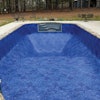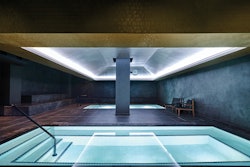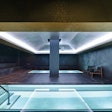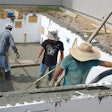
As CEO of Premier Pools & Spas, Paul Porter has led his company to a level of success that is by any measure unusual and extraordinary for a pool construction company — their 2013 sales passed a dizzying $120 million. Here he shares his thoughts on how others can also achieve greater success by focusing on the customer experience.
What’s your general assessment of the pool construction industry?
Opportunity and growth potential has never been greater, but implementation and execution has probably never been weaker.
Where’s the disconnect?
As an industry, we’re not reaching the consumer. There are too many misconceptions about affordability, maintenance and lifestyle. We still depend on other industries, such as the hotel and travel industries, and even sporting events, to promote pool ownership. We see an uptick in interest following the summer Olympics because the lifestyle is being promoted. Beyond that we really don’t have a collective message.
All too often, the only time people get the message is when they go on vacation and experience the family unity and enjoyment of swimming pools, that sense of sanctuary, peace and excitement, then they want to recapture that when they come home. Or, sometimes they feel it when someone builds a pool in their neighborhood; they go over and experience the validation and family unity that comes with pool ownership.
We’re also fighting issues that drive people away. We’re experiencing that right now in California with water shortages. Because they haven’t heard any differently, many homeowners believe that pools are water wasters; but yet don’t have a second thought about putting in landscaping. Oftentimes, we make matters worse because when we go out we’re defensive about it rather than proactive.
Do you think the way the industry competes for business is part of the problem?
Absolutely. When you have three or four companies talking to a potential customer, maybe one of those companies will reinforce the positive aspects of pool ownership while the other three are intimidated by the competition and respond by chopping the legs out from under their competitors. That leaves the homeowner with a negative feeling about the industry.
I don’t know how we deal with that problem, but it definitely hampers our efforts. Negativity diminishes the value of the product. It’s something I’ve been dealing with for 25 years, and it never seems to change.
Do you think the positive messaging should happen on a national level or on the dealer level?
Both, but I believe it has to first and foremost happen on the dealer level. There’s an old saying that you can’t advertise yourself into a good reputation, you have to earn it. That’s really the impetus behind our approach. We do everything we can to elevate the experience the customer has so they don’t view us on the same level as used car salesman. If we don’t change the experience, people will always make a decision on price, it’s the lowest common denominator.
Instead, we should strive to have the consumer evaluate our products based the way they evaluate other products, meaning what it will do for them and how it will improve their lives. People will spend the most money they have based on the value they equate with the product. It’s just common sense, when we devalue our industry by competing strictly on price, naturally that’s the way the consumer is going think and how they’re going to make their purchasing decision. No one benefits from that mindset, not the homeowner, the builder or the industry overall.
We’re trying to change that from the moment we walk in the front door. We do it with literature; with our professional appearance and demeanor and especially with the way we talk about the experience of pool ownership. We focus on fact finding to determine what the customer really wants and follow that up with proposals that reflect those values.
Our goal is to educate the customer so they can make a better decision, and we have processes in place that results in accurate expectations of what the installation process is about and what the experience of ownership will be when we’re finished. That’s how you promote the product and it’s really up to each builder to work on that level, otherwise, we’re just fighting ourselves.
What are your thoughts on contending with problematic issues such as safety?
Let’s face it, journalists like to focus on issues that are sensational. Unfortunately, a five year old being severely injured or worse is a lot more sensational than someone sitting around and enjoying a barbecue. In the media world, the negativity might sell more magazines or newspapers, but it certainly isn’t promoting the industry. In fact, that kind of negative and sensationalized coverage has the opposite effect. It generates fear. We’ve learned that the best way to deal with those important concerns is by speaking directly to those issues in a way that empowers the homeowner with information they can use to maintain a safe environment in their home. Even a tough issue like safety can be turned around if it’s handled in a positive way.
Ultimately, the only way you break away from the negativity that impacts our industry is by example. Through our success, we’re showing others in our business that there’s profit, growth potential, a succession plan and an exit strategy in this business. Elevating the way you do business is really only way to offset the negatives. The bad press will, unfortunately, probably always be there, so it’s up to us to do business in such a way that builds confidence in the mind of the consumer rather than reinforcing fear, which is almost always a result of a lack of information.
Sounds like you’re advocating an entirely different type of mindset.
The one thing we don’t emphasize enough throughout the industry is that we have an exciting product that people want and that people dream about. It’s a product that makes people happy and they take pride in. The problem is that many people don’t understand that pool ownership is a reality for them for any number of reasons, while at the same time they might be spending as much or more on a luxury automobile. We need to communicate the messages that reinforce the positives, that pools don’t waste water compared to lawns, that it provides a form of exercise that can benefit people of all ages. Our product provides health, happiness and is a powerful sign of prosperity.
Back to your question about where the promotion should happen, we can have a national marketing campaign promoting all the benefits, but it doesn’t do much good if we follow that up by self-destructing when we get in front of the customer. That’s why it has to happen on the dealer level, because that’s where the experience happens and where homeowners ultimately form their opinions about the value of the product and the nature of the industry itself.
I can’t tell you how many times I’ve heard people say that they were considering buying a pool until they heard all the bad-mouthing and so they decided instead to go out and buy a boat. Ultimately we’re shrinking the market. It’s self-defeating and until we collectively change, we’ll never come close to realizing the full potential that’s out there in the market, right now!
Do you believe our industry has the capacity to turn that around?
Yes, when you think and act differently, there is tremendous opportunity. We recently sold 46 pools in one neighborhood. I doubt most people in our industry would believe there’s that much demand in one neighborhood, but the reality is when you approach the process from a validation standpoint, you can tap into a much greater level of demand and market potential. That’s what we can achieve when we do it right, because there’s probably no product that can bring more value to a family than a swimming pool, but we have to dare to look at it in those terms.
Think about it, pools can become an integral part of the family experience and they can become an integral part of the home environment. That’s not something we have to invent because it really comes down to understanding the nature of water itself. As we all know, we all come from water, we know that water is soothing and we know it’s invigorating. The pool environment can become a sanctuary, a place of peace. It’s our job to promote it correctly and reinforce those values rather than undermine them.
We have to listen for those hot buttons and do everything possible to reinforce and magnify the benefits and values that exist in the minds of consumers.
How do you manage expectations for the installation process?
I look at it this way: It’s not the bomb that goes off in the backyard that creates stress, it’s not fully knowing what to expect that causes problems. We tell the customers that the end product is going to be fantastic, that their dreams will come true, but close the blinds during the construction process. There’s no getting around the fact that it’s going to bet worse before it gets better. The problem is overselling and underperforming, or even more so, under-informing. It’s when the homeowner doesn’t know what to expect that they go sideways. Lack of information will drive anyone crazy, especially when their backyard is temporarily torn up.
On the other hand, if the homeowner knows what to expect and the process goes forward according to their expectations, they’ll generally be comfortable with the installation process. It’s when they don’t know what’s going to happen they have problems. Too many builders assume the customer knows what’s going to happen out there, but they don’t. Some builders get defensive about it when the homeowner complains, which makes the situation even worse.
Before we show up with the heavy equipment, we’ve already gone through the entire process with the homeowner. We’ve painted the pool on the ground, we’ve shown them where the equipment is going to go, where the j-boxes will be installed and we describe in detail the installation process. That way there aren’t any surprises. I’ve found that people don’t get mad because you’ve done something wrong, they get mad because they’re scared you don’t know what you’re doing and that’s when they lash out. When you don’t communicate, you plant fear in their minds.
How does establishing those kinds of expectations play into the referral process?
Again, it’s all part of the validation process. When people are aware of what’s happening and they feel good about their purchasing decision, that’s when they’re going to brag about it to others. They want to feel good about it. As professionals we have both the responsibility and the opportunity to support those positive feelings.
In my opinion, validation is underestimated in our business. We have a product that can make a breadwinner feel good, probably better than any other investment they make. The pool becomes part of why they love their home. It’s a message to their neighbors that they are successful and it’s a message to their family that they’re doing things to stay together and share in the good life. That’s all-important to people, to be validated when they’re making significant buying decisions. It’s human nature.
With your level of success, do you see yourself as setting an example for others in the industry?
We’re very proud of the fact that we are the biggest pool builder in the world by almost double. That’s led to a level of acceptance within the industry that, as an industry, we need to take a different approach. If you want a better result, you have to change the way you do things. Right now, I see an industry that’s aging and every year we’re losing a little bit of enthusiasm, we’re falling a little bit farther behind.
In our company, we’re trying to change the culture, bringing in new people who are focused on success and driven to do things in a more positive way. The most important thing we tell our people is that you have to keep your word. You’ve sat in someone’s home, listened to them, described the product and the process, you’ve reinforced their excitement. That’s all great, but if you don’t deliver on those promises, all the upbeat discussion in the world isn’t worth anything. It’s just talk.
If the salesperson promises they’ll be there throughout the process, especially if something goes wrong, but then disappears, it makes the customer feel stupid. No one likes to feel like they’ve been misled.
Keep in mind if you do a good job they’ll tell two people, but if there are problems that aren’t resolved in a timely manner, they’ll tell ten. That’s why managing expectations and delivering on those expectations, or exceeding them is so important. That’s why we sold 46 pools in one neighborhood and why we’re experiencing widespread success in markets throughout the country.
Do you see that approach working across the spectrum of buyers in terms of budgets?
Yes, if someone has $200,000 dollars to spend, that doesn’t mean their experience should be greater than the person who has $50,000. That’s a lot money for most people and they deserve the same level of service and care. Also, it’s not surprising that when you generate excitement and show middleclass customers what’s possible, they’ll often find the money for features they really want. And, when they come away from the process with that all-important validation, they become ambassadors for your company.
It’s important to always treat your customers the way you would want to be treated, regardless of their budget.
Frankly, our industry has never seen growth we’ve seen in our company. Not only have we seen that growth in the boom period, we also saw it through the recession, which was the bleakest period our industry has ever experienced. That success has shown me, and people throughout our organization, that focusing on the customer experience works and does so far more effectively than most people in our industry would ever imagine.
Comments or thoughts on this article? Please e-mail [email protected].








































